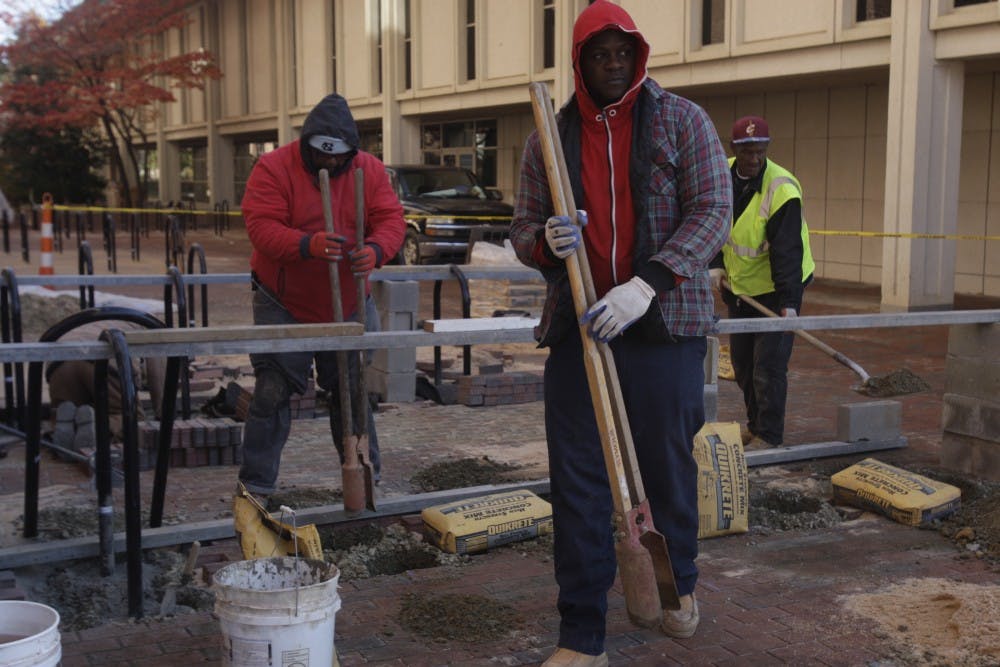“The Student Fee Audit Committee is the bottom rung of the ladder which evaluates requests for student fee increases,” according to the committee's website. Its role is to listen to proposals, and make notes that convey the student perspective.
“This is a place where students are able to ask questions, voice their concerns,” Hernandez said.
Although fees do not require consent from the SFAC in order to be passed, the University almost always runs its ideas by the committee; this way, students are able to listen to and understand administrative decisions.
The third and most powerful committee in the process is the Tuition and Fee Advisory Task Force. Unlike the two previous committees, it’s comprised of UNC administrators and BOT members. TFAT reviews all proposed fees, decides whether they should be approved or denied, and can make alterations before sending the complete proposal to the Chancellor and BOT.
Currently, the proposed fee package for 2019-20 has been approved by UNC and is awaiting a vote from the BOG.
Putnam said she thinks the problem is that the new debt service fee was introduced in TFAT. She said she thinks the BOT totally sidestepped the standard system, which is designed to hold the University accountable in student matters.
Hernandez said TFAT unveiled the Debt Service Fee without first gathering student input.
“This is where the idea of student self governance, feedback, conversation between administration and students, kind of broke down,” he said.
Although Putnam acknowledged the need for UNC to find new ways to improve its infrastructure, she was critical of how the Debt Service Fee popped up in the final committee. She said she thinks this move made it seem like student opinion was not a concern in the creation of the new $65 fee.
“I wish we would’ve explored different avenues, and taken it through SFAC, SFAS, and then to TFAT, instead of starting there,” she said.
Putnam said after TFAT added the debt service fee to the proposed package, it retroactively met with SFAC and SFAS, the student-led committees, to inform them of the adopted changes to the proposal.
“One member of (TFAT) told the committees that it was a courtesy ideas were even presented to the first two committees,” Putnam said. “It was just incredibly frustrating overall to feel like the student voice was invited into the space but not actually taken into account.”
To get the day's news and headlines in your inbox each morning, sign up for our email newsletters.
Both presidents were shocked and nervous about their lack of knowledge surrounding the new fee, and are now concerned about UNC’s selective hearing when it comes to the student voice.
“I think we rushed into it,” Hernandez said. “We can’t even go back to revisit it.”
'We’re an old university'
“We’re an old university, and we have hundreds of millions of dollars in deferred maintenance,” Chancellor Carol Folt said at the November BOT meeting. “You hit a point when old buildings get old. We’re trying to deal with that. We can’t rely fully on the state.”
The Debt Service Fee is projected to generate $1.8 million in revenue, which will be used to support $23 million of debt. With the extra $65 per student, the University will be able to borrow money to engage in the necessary construction.
UNC needs more construction money than the state is willing to provide. At the BOT meeting, Trustee Chuck Duckett said the University needs to figure out how to take care of its own problems.
“I really think we need to borrow $100 million dollars to make a serious dent in some of this (repair and renovation cost),” he said.
Currently, Pruitt estimates UNC has nearly a billion dollars tied up in deferred maintenance, and this fee will help chip away at the staggering sum.
“When you look at it and you say $750-850 million dollars, peoples’ eyes roll back in their heads,” Duckett said. “But it’s real.”
'We used all the headroom'
Aside from championing the Debt Service Fee, the TFAT committee made other alterations to the proposed fee package. Pruitt said Campus Health Services requested a 3.5 percent increase in the Student Health Fee, which would go toward funding mental health program needs.
TFAT declined the request, which came highly endorsed by SFAC and SFAS, and told Campus Health to use its existing fund balance to cover the costs.
“It feels like a short-term solution to a long-term problem,” Putnam said.
Additionally, Hernandez is nervous about the University’s termination of the Student Child Care Services Fee. Instead of continuing to tax all students to fund child care services for student parents, UNC decided it would handle child care costs internally.
“We just want to be assured that the services will function at the same level as if the fee was in place,” he said.
He is concerned about the potential disappearance of the services or a diminishment of their quality.
The Board of Governors has a policy regarding the increase of student fees: “Mandatory student fees are capped at a maximum of 3 percent annual increase.”
At the November BOT meeting, Pruitt was asked how the University arrived at the exact number for the Facilities Maintenance Debt Service fee, $65.39.
“We used all the headroom up to the 3 percent statutory cap,” he said.
university@dailytarheel.com



